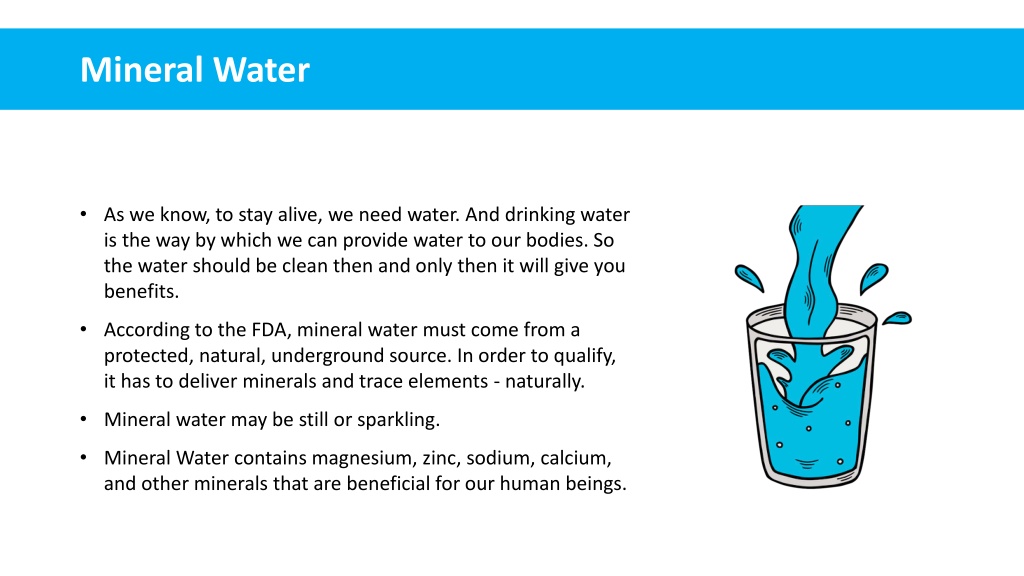
The Enduring Allure of Mineral Water: A Deep Dive into Its Origins, Benefits, and Varieties
In a world saturated with beverage choices, from sugary sodas to artificially flavored drinks, the simple elegance of mineral water continues to captivate consumers. More than just a thirst quencher, mineral water boasts a rich history, a unique composition, and a range of purported health benefits. This article delves into the fascinating world of mineral water, exploring its origins, the science behind its properties, and the diverse varieties available to quench your thirst and potentially enhance your well-being.
The appeal of mineral water is undeniable. It’s a drink that has graced tables for centuries, enjoyed by royalty and commoners alike. But what exactly is it that makes mineral water so special? The answer lies in its source and the natural processes that shape its composition.
The Genesis of Mineral Water: From Earth’s Depths
The story of mineral water begins deep within the earth. Unlike ordinary tap water, which is typically sourced from surface water bodies and treated for consumption, mineral water originates from underground aquifers, often protected from surface contamination by layers of rock and soil. As the water percolates through these layers, it absorbs various minerals, giving it its unique flavor profile and, more importantly, its distinctive composition.
These underground sources can be found all over the world, from the volcanic regions of Italy to the glacial springs of Iceland. The specific mineral content of the water varies depending on the geological characteristics of the area. This is why mineral water from different regions can taste and feel so different.
The Science of Minerals: What’s in Your Water?
The defining characteristic of mineral water is its mineral content. These minerals, which are naturally occurring inorganic substances, are dissolved in the water and contribute to its overall taste and potential health benefits. Common minerals found in mineral water include:
- Calcium: Essential for bone health, muscle function, and nerve transmission.
- Magnesium: Plays a crucial role in energy production, muscle relaxation, and blood sugar control.
- Sodium: Helps regulate fluid balance and nerve function.
- Potassium: Important for maintaining blood pressure and muscle function.
- Bicarbonate: Can help neutralize stomach acid.
- Sulfate: May have a mild laxative effect.
- Chloride: Helps maintain fluid balance.
The concentration of these minerals is what differentiates mineral water from other types of water. The levels are carefully monitored and regulated to ensure the water meets quality standards. The presence and proportions of these minerals also influence the taste, with some waters being described as subtly sweet, others as slightly salty, and still others as having a more pronounced mineral flavor.
Types of Mineral Water: A World of Choices
The world of mineral water is surprisingly diverse. While all mineral water shares the common characteristic of containing dissolved minerals, the specific mineral composition and carbonation levels vary, leading to a wide range of choices for consumers. Here are some of the most common types:
- Naturally Sparkling Mineral Water: This type of mineral water contains natural carbon dioxide, which gives it its effervescence. The carbonation occurs naturally within the underground source and is bottled without any added carbon dioxide.
- Naturally Still Mineral Water: This mineral water is uncarbonated and retains its natural mineral content.
- Carbonated Mineral Water: This type of mineral water has carbon dioxide added to it, resulting in a sparkling effect. The carbonation may or may not be natural to the source.
- Flavored Mineral Water: Some brands add natural flavors, such as fruit extracts, to their mineral water.
When choosing mineral water, it’s important to consider your personal preferences and any specific dietary needs. For example, those with high blood pressure might want to choose a low-sodium option. Others might prefer the refreshing bubbles of sparkling water, while some enjoy the purity of still water.
Health Benefits: More Than Just Hydration?
Beyond its ability to quench thirst, mineral water is often touted for its potential health benefits. While more research is always needed, studies suggest that consuming mineral water can offer several advantages:
- Improved Hydration: Hydration is fundamental to health, and mineral water provides an excellent way to maintain proper hydration levels.
- Digestive Health: The bicarbonate content in some mineral water can help neutralize stomach acid and aid digestion.
- Bone Health: The calcium content in some mineral water contributes to bone health.
- Muscle Function: Magnesium, another common mineral in mineral water, is essential for muscle function.
- Potential Blood Pressure Benefits: Some studies suggest that low-sodium mineral water may help lower blood pressure.
It is important to note that the health benefits of mineral water can vary depending on the specific mineral composition. Always check the label for the mineral content and consult with a healthcare professional if you have any health concerns.
The Production Process: From Source to Bottle
The journey of mineral water from its underground source to your glass is a carefully controlled process. The water is extracted from the source, often using specialized pumps, and transported to a bottling facility. Before bottling, the water undergoes rigorous testing to ensure its purity and mineral composition. The water is then bottled in sterilized containers, often glass bottles to preserve the integrity of the water, and sealed to maintain freshness.
The production process is subject to strict regulations to ensure the safety and quality of the mineral water. Manufacturers must adhere to guidelines regarding water source protection, bottling procedures, and labeling requirements. This ensures that consumers can trust the quality of the product they are purchasing.
Choosing and Enjoying Mineral Water
With so many options available, how do you choose the right mineral water for you? Here are a few tips:
- Read the Label: Pay attention to the mineral content, sodium levels, and carbonation level.
- Consider Your Preferences: Do you prefer still or sparkling water? What flavors do you enjoy?
- Try Different Brands: Experiment with different brands and types of mineral water to find your favorites.
- Pair with Food: Mineral water can complement a variety of foods. The bubbles of sparkling water can cleanse the palate, while still water can be a refreshing accompaniment to meals.
- Stay Hydrated: Make mineral water a regular part of your daily routine to stay hydrated and enjoy its potential health benefits.
Sustainability and Mineral Water
The environmental impact of mineral water production is an increasingly important consideration. The use of plastic bottles can contribute to plastic waste, while the transportation of bottled water can increase carbon emissions. Many brands are now taking steps to improve their sustainability practices, such as using recycled materials for bottles, reducing packaging, and investing in eco-friendly transportation methods. Consumers can also make a difference by choosing brands that prioritize sustainability and by recycling their bottles responsibly.
The Future of Mineral Water
The mineral water industry continues to evolve, with ongoing innovation in product development, sustainable practices, and consumer education. We can expect to see more focus on:
- Enhanced Flavors: More sophisticated flavor combinations, using natural ingredients.
- Functional Waters: Waters enhanced with added vitamins and minerals.
- Sustainable Packaging: Increased use of eco-friendly packaging materials.
- Transparency: Greater emphasis on providing consumers with information about the source, mineral content, and environmental impact of the products.
The future of mineral water looks bright, as consumers continue to seek healthy and refreshing beverage options. With its rich history, unique composition, and potential health benefits, mineral water is poised to remain a popular choice for generations to come.
In conclusion, mineral water is more than just a beverage; it’s a testament to the earth’s natural bounty. Understanding its origins, mineral composition, and the factors that influence its quality allows consumers to make informed choices and appreciate the unique qualities of this timeless drink. From its origins deep within the earth to the refreshing taste in your glass, mineral water offers a world of flavor and potential benefits. As we move forward, the focus on sustainable practices and consumer education will only enhance the enduring allure of mineral water.
[See also: Related Article Titles]

